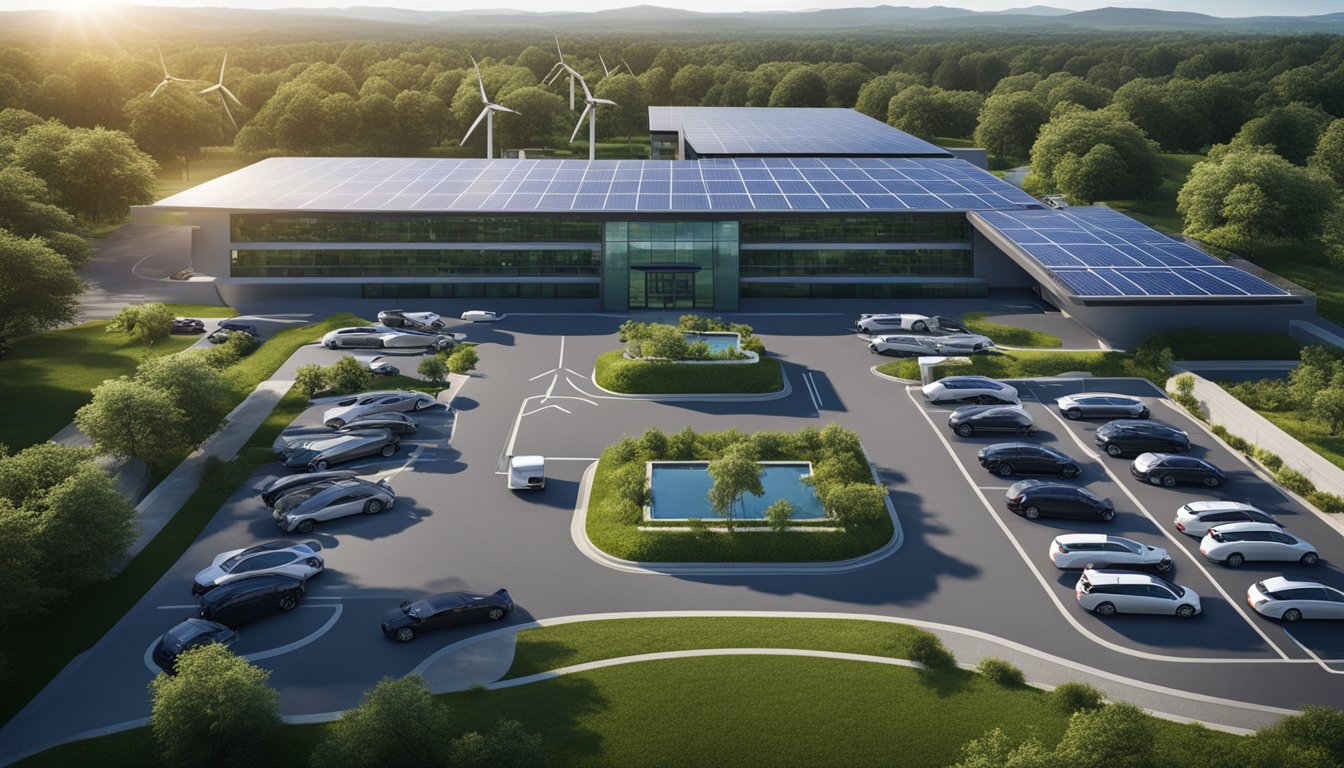Late updated: 27 Jun 2024 20:06
Written by: Amber Collins
Leveraging Green Technology For Business Growth: Sustainable Strategies for Modern Enterprises
Leveraging green technology for business growth is not just a trend, it's a strategic move that can propel a company to new heights. We see a revolution where businesses integrate sustainability into their core operations, fuelled by a growing commitment to environmental responsibility. The incorporation of green tech not only enhances operational efficiency but also opens new avenues for innovation and competitive edge.

Our journey towards incorporating green solutions is backed by data and real-world successes. For instance, mid-sized companies strategically leveraging technology for sustainability are experiencing significant growth. Their approach combines profit with purpose, showcasing that green initiatives are both economically and environmentally beneficial.
The drive towards net zero and sustainability isn't just about ethical responsibility. It's about recognising the vast business opportunities that arise from it. Building a green business requires substantial investment, yet the returns in terms of growth and market positioning are substantial. As businesses embrace green technology, they set themselves up for sustainable success, gaining loyalty from the eco-conscious consumer base.
Key Takeaways
- Incorporating green tech boosts operational efficiency and drives innovation.
- Mid-sized companies demonstrate growth by strategically leveraging sustainability.
- Investment in green tech leads to significant market positioning and loyal consumers.
Fundamentals of Green Technology in Business
We focus on how green technologies can drive sustainable business growth through innovative solutions and efficient use of resources. Understanding the various types of green technologies and their applications will enable businesses to seize competitive growth opportunities.
The Role of Green Technologies in Sustainable Business Growth
Green technologies are essential in achieving environmental sustainability and enhancing operational efficiency. Businesses can significantly reduce their carbon footprint by adopting low-carbon technologies, such as renewable energy solutions like solar power and wind power. These technologies not only help in reducing emissions but also promote energy efficiency and resource efficiency.
Implementing green technology innovations can lead to cost savings and create new growth opportunities. By embracing green business models, companies can adapt to the changing market landscape and gain a competitive edge. The integration of green technologies into business operations and strategies fosters a circular economy, where resources are reused and recycled, contributing to long-term sustainability.
Understanding Green Technologies: Types and Applications
Green technologies encompass a wide range of solutions aimed at promoting environmental sustainability. Key types include:
- Renewable Energy Technologies: Utilising solar power, wind power, and other renewable sources to generate clean energy.
- Energy-efficient Hardware: Advanced semiconductor technologies, low-power CPUs, and energy-efficient GPUs that minimise energy consumption.
- Waste Management and Recycling Technologies: Innovations that support a circular economy by enabling the reuse and recycling of materials.
By integrating these technologies, businesses can improve their environmental impact while enhancing operational efficiency. Furthermore, the adoption of green technologies supports the development of green businesses, paving the way for sustainable growth and greater resilience against environmental challenges.
Accelerating Business Performance through Green Tech

By implementing green technology, businesses can achieve significant improvements in performance, driven by innovative applications, strategic partnerships, and supportive financial ecosystems.
Leveraging Digital Technologies for Environmental Goals
Digital technologies play a crucial role in advancing environmental objectives. Big data and cloud computing enable precise monitoring and management of resources. For instance, data analytics can help businesses optimise energy use, reducing both costs and carbon emissions. Additionally, Internet of Things (IoT) devices facilitate real-time tracking of environmental impact, allowing for immediate adjustments. These technologies support sustainable development by improving efficiency and promoting the adoption of green practices. Companies leveraging digital transformation see enhancements not just in sustainability but also in their competitive edge.
Partnerships and Governance in Green Tech Initiatives
Strategic partnerships are fundamental in scaling green technologies. Collaborations between start-ups and incumbents can drive innovation and market acceptance. Partnerships with larger firms allow smaller companies to access necessary capital and expertise. Effective governance, aligned with frameworks like the Science Based Targets initiative, ensures that these collaborations produce meaningful results. Companies that establish robust governance structures can better navigate policy requirements and align their efforts with carbon neutrality goals. This, in turn, enhances both competitive positioning and business opportunities.
Financial Drivers and Market Conditions Shaping Green Tech
Capital markets are increasingly favouring green technology adoption. Investment in climate-friendly technologies has surged due to favourable market conditions and supportive financial instruments. For instance, sustainability-linked bonds and green loans offer attractive financing terms tied to environmental performance. Market insights suggest a consistent growth trajectory for green tech, creating robust opportunities for profitability. By understanding and leveraging these financial drivers, businesses can better align their strategies with evolving demands and improve their financial performance.
In summary, the integration of green technology within business operations not only supports environmental goals but also drives substantial performance gains through improved efficiency, strategic partnerships, and favourable financial conditions.
Frequently Asked Questions

In this section, we address common questions regarding the integration and impact of green technology in business growth. These answers will help businesses understand the benefits, measurement techniques, and challenges associated with adopting green technology.
What are the key benefits of integrating green technology into business operations?
Green technology enhances operational efficiency, reduces costs in the long run, and improves brand reputation. It also fosters innovation by encouraging the development of new, sustainable products and services. Additionally, using green technology helps companies meet regulatory requirements and reduce their carbon footprint, contributing positively to environmental conservation.
How can companies measure the impact of green technology investments on their growth?
Companies can measure the impact of green technology investments through metrics such as energy savings, reduction in greenhouse gas emissions, and cost savings from waste reduction. Financial metrics, including ROI (Return on Investment) and payback periods, are also useful. Surveys and feedback from stakeholders can provide insights into improvements in brand perception and customer satisfaction.
In what ways can startups leverage sustainability for competitive advantage?
Startups can leverage sustainability by incorporating eco-friendly practices from the outset, which can attract environmentally conscious customers and investors. Utilizing renewable energy, minimising waste, and ensuring sustainable supply chains can differentiate them from competitors. Additionally, transparent communication about sustainability efforts can build trust and strengthen their market position.
What strategies should businesses employ to ensure scalability while adopting green technologies?
Businesses should start with pilot projects to test and refine green technologies before full-scale implementation. Collaborating with experts and utilising government incentives can reduce costs and risks. Continuous monitoring and adapting strategies based on performance data ensure scalable, sustainable growth. Prioritising employee training and engagement ensures smooth transition and integration.
How is the adoption of green technology influencing economic development?
Adopting green technology drives economic development by creating new markets and job opportunities in sectors like renewable energy and green manufacturing. It encourages innovation and reduces reliance on non-renewable resources, leading to more sustainable economic growth. Moreover, it helps mitigate environmental risks, promoting a healthier, more resilient economy.
What are the challenges businesses face when transitioning to green technology, and how can they overcome them?
Businesses often face high initial costs, technological complexities, and resistance to change. To overcome these challenges, they can pursue government subsidies and incentives designed to offset costs. Partnering with experienced green tech providers can ease technological integration. Additionally, fostering a corporate culture that values sustainability can help mitigate resistance and ensure smoother transitions.
